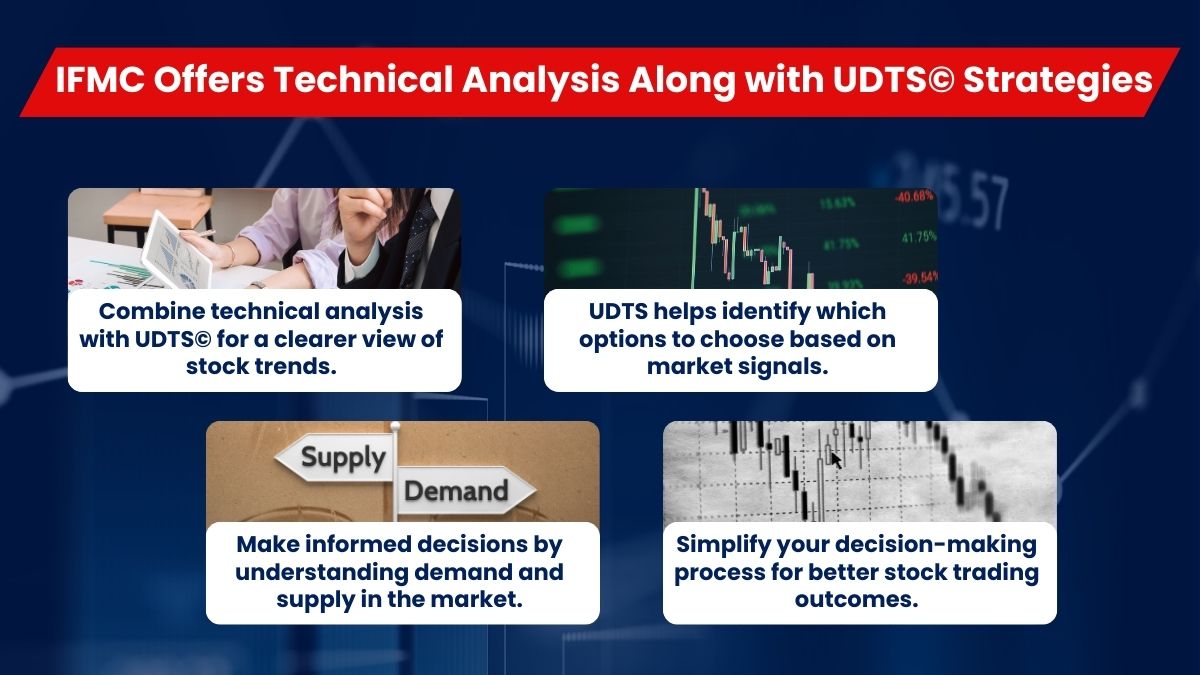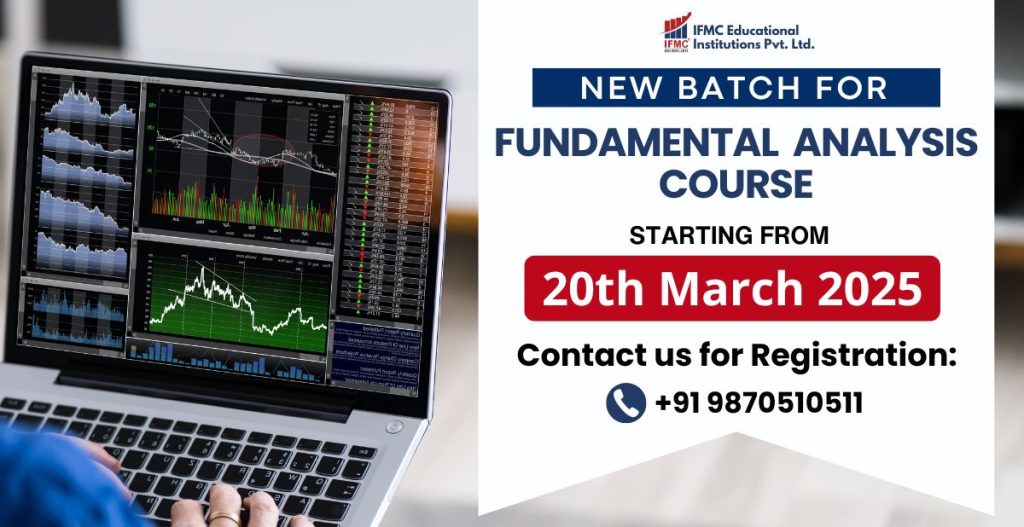In the world of finance, understanding the share market and stock market analysis is a must for investors and traders. IFMC Institute’s Fundamental and Technical Analysis Course in India is a complete stock market education. Stock market technical and fundamental analysis both have yielded impressive results for users. They are completely different from each other. When it comes to investing in the stock market there are several tools to study market behavior. These studies allow investors to analyze emerging market trends. Broadly we can classify stock market analysis into two approaches: Technical Analysis and Fundamental Analysis. They are two important methods of forecasting the future trends of financial market instruments. Each approach serves its own advantage. But how these two are different from each other?
What is Technical analysis?
Technical analysis is a trading discipline. It is employed to determine investment and distinguish trading potential by analyzing statistical trends. By learning technical analysis, a learner gets equipped with the power of logical reasoning. In other words, technical analysis is a method of forecasting price movements through the study of price data. Here is a list of relevant factors affecting the intrinsic value:
- Historical price of stocks
- Average trading value over time
- Forex and trading trends
The primary tool for technical analysis is price data. Price data is the most important consideration regardless of the chosen timeframe. The purpose of this analysis is to capitalize on pricing opportunities. In addition, to determine market trends around each share. However, the method is purely based on historical data this is considered to be a backward-looking technique. Read IFMC’s comprehensive guide on what technical analysis is.
What is Fundamental Analysis?
Fundamental analysis is a process of evaluating security in an attempt to determine its intrinsic value. This concept takes into account the company’s both tangible and intangible aspects. However, this is done by looking at the basic economic factors and the elements which would impact its value. So, fundamental analysis is the best option if you want to learn about a company’s health. Here is a list of relevant factors affecting the intrinsic value:
- Income, expenses, and revenues
- Return on equity
- Companies growth rate
- Competitive environment of business
- Balance sheet: Understanding and interpreting the balance sheet to evaluate the financial health of a company
Technical Analysis vs. Fundamental Analysis
Technical Vs. Fundamental Analysis. What is the best way to invest? It’s a common question that people ask when it comes to choosing between the two. Here are a few factors used for selecting the best methods.
First, the important thing to consider is the time horizon of your approach. Technical analysis is a short-term method whereas fundamental analysis is a long-term investment strategy. By trading on market trends, technical analysis is short-term focused. While by pricing on intrinsic values, fundamental analysis is working toward the company’s long-term value.
Second, you need to consider the type of investment approach. Are you a trader or investor? Technical analysis is a comprehensive trading strategy aimed to drive returns, thereby identifying trends and opportunities. Fundamental analysis is determining the underlying forces that affect the well-being of companies, industry, and the economy. Specifically, analyze the factors that drive your returns.
Key Points:
- Fundamental Analysis looks into financial data and economic factors
- Technical Analysis looks into statistical trends and price movements
- IFMC Institute offers courses that combine both
| Aspect | Technical Analysis | Fundamental Analysis |
|---|---|---|
| Definition | The statistical method is used to determine a pattern and predict future price movements. | Determine the company’s stock to find intrinsic value and analyze factors affecting price in the future. |
| Objective | Measure the right time to enter and exit the market. | To find Intrinsic value |
| Vision | Looks Backward | Looks both backward and forward |
| Methodology | Price MovementsMarket Psychology | Financial DataIndustry TrendsCompetitors BehaviorEconomic Overview |
| Time Horizon | Short-Term Approach | Long-Term Approach |
| Function | Trading | Investing |
| Data Collection | Charts | Financial Statements |
| Concept | Dow TheoryPrice Data | Return on Equity (ROE)Return on Assets(ROA) |
| Stock bought | When the price falls below the intrinsic value | When a trader believes they can sell it for a higher price. |
| Popular Tools | Currency Correlation ToolForex Volatility ToolTechnical Indicators & OscillatorsPrice Action AnalysisChart Pattern Analysis | Economic CalendarFinancial NewswiresAnalyst Reports |
Benefits of Combining Analysis Methods
Combining fundamental and technical analysis methods can provide a more comprehensive understanding of the stock market and help investors make more informed decisions. Fundamental analysis helps investors understand a company’s financial health, management team, industry trends, and competitive position, while technical analysis helps identify patterns and trends in price and volume data. By combining both methods, investors can gain a more complete picture of a company’s potential for growth and make more accurate predictions about future price movements.
Some of the benefits of combining analysis methods include:
- Improved accuracy: By considering both fundamental and technical factors, investors can make more accurate predictions about future price movements.
- Increased confidence: Combining analysis methods can help investors feel more confident in their investment decisions.
- Better risk management: By considering both fundamental and technical factors, investors can better manage risk and avoid potential pitfalls.
- More comprehensive understanding: Combining analysis methods can provide a more comprehensive understanding of the stock market and help investors make more informed decisions.
Fundamental Analysis
Fundamental Analysis is the base of long-term investment strategies. It involves evaluating a company’s intrinsic value by looking into various economic, financial, and qualitative factors.
Components of Fundamental Analysis:
- Economic Analysis
- GDP growth
- Inflation rates
- Interest rates
- Industry Analysis
- Market size and growth
- Competitive landscape
- Regulatory environment
- Company Analysis
- Financial statements
- Management quality
- Competitive advantages
- Quarterly results: Evaluating the company’s performance through its quarterly results
IFMC’s Fundamental Analysis Course:
- Duration: 18 hours (classroom), 13 hours (online)
- Key Topics:
- Financial statement analysis
- Valuation methods
- Economic indicators
- Learning Outcomes:
- Ability to analyze company financials
- Skill to determine intrinsic value
- Understanding of economic impact on stocks
Technical Analysis
Technical Analysis is used for short-term trading strategies. It involves studying price movements and patterns to predict future market behavior.
Components:
- Chart Analysis
- Trend lines
- Support and resistance levels
- Technical Indicators
- Moving averages
- Relative Strength Index (RSI)
- Price Patterns
- Head and shoulders
- Double tops and bottoms
IFMC’s Technical Analysis Course:
- Duration: 30 hours (classroom), 12 hours (online)
- Key Topics:
- Candlestick patterns
- Volume analysis
- UDTS© (Uni-Directional Trade Strategies)
- Learning Outcomes:
- Ability to read and interpret charts
- Skill to identify trading opportunities
- Understanding of market psychology
Comparison: Fundamental vs Technical Analysis
| Aspect | Fundamental Analysis | Technical Analysis |
|---|---|---|
| Focus | Company’s intrinsic value | Price and volume trends |
| Time Horizon | Long-term | Short to medium-term |
| Data Used | Financial statements, economic data | Historical price and volume data |
| Best For | Investors | Traders |
Top Courses for Stock Market Analysis in India
There are several top courses for stock market analysis in India that can help investors improve their skills and knowledge. Some of the top courses include:
- MADE Market Analysis by Data and Event: This course provides a comprehensive understanding of fundamental analysis and helps investors learn how to evaluate a company’s financial health and make informed investment decisions.
- Unidirectional Trade Strategies (UDTS): This course offers a thorough understanding of both fundamental and technical analysis, equipping investors with the skills to evaluate a company’s financial health and make informed investment decisions.
- Stock Market Course for Traders Advanced: This course provides a comprehensive understanding of investment analysis, helping investors learn how to evaluate a company’s financial health and make informed investment decisions.
Course Curriculum and Topics Covered
The course curriculum for stock market analysis typically covers a range of topics, including:
- Fundamental analysis: This includes topics such as financial statements, economic analysis, industry analysis, and company analysis.
- Technical analysis: This includes topics such as charts, trends, and patterns.
- Investment strategies: This includes topics such as value investing, growth investing, and dividend investing.
- Risk management: This includes topics such as diversification, hedging, and stop-loss orders.
- Market analysis: This includes topics such as market trends, market sentiment, and market analysis.
Choosing the Right Course for Your Needs
Choosing the right course for your needs depends on several factors, including your investment goals, risk tolerance, and level of experience. Here are some tips for choosing the right course:
- Consider your investment goals: If you’re looking to invest in the stock market for the long term, you may want to consider a course that focuses on fundamental analysis. If you’re looking to trade in the short term, you may want to consider a course that focuses on technical analysis.
- Consider your risk tolerance: If you’re risk-averse, you may want to consider a course that focuses on risk management and hedging strategies.
- Consider your level of experience: If you’re new to the stock market, you may want to consider a course that provides a comprehensive introduction to stock market analysis. If you’re more experienced, you may want to consider a course that provides more advanced training.
IFMC’s Fundamental and Technical Analysis Course
IFMC Institute offers a course that combines both fundamental and technical analysis for a complete stock market education.
Course Features:
- Both fundamental and technical analyses covered
- Practical, live training with market examples
- MADE© (Market Analysis by Data and Event) methodology
- UDTS© strategy for intraday trading
Learning Outcomes:
- Ability to analyze stocks
- Skill to make informed decisions
- Understanding of long-term and short-term market
Course Delivery Methods
IFMC Institute offers various learning options to suit different student needs:
- Classroom Courses:
- In major Indian cities
- Live sessions with faculty
- Networking with peers
- Online Courses:
- Self-paced learning
- Video lectures and e-learning material
- Online doubt-clearing sessions
Career Opportunities
After completing the Fundamental and Technical Analysis Course
- Research Analyst
- Portfolio Manager
- Investment Advisor
- Equity Analyst
- Risk Manager
The skills are highly valued in banks, mutual funds, and stockbroking firms across India.
Certifications and Recognition
IFMC Institute courses are industry-recognized:
- NCFM (NSE’s Certification in Financial Markets) certified
- NISM (National Institute of Securities Markets) certified
- IFMC certification on course completion
These certifications will add value to your resume and enhance job prospects in the financial sector.
USP of IFMC Courses
- Faculty with industry experience
- Practical, live training with market examples
- Proprietary strategies: UDTS© and MADE©
- Both fundamental and technical analyses covered
- Classroom and online options
Additional Resources
In addition to taking a course, there are several additional resources that can help you improve your skills and knowledge in stock market analysis. Some of these resources include:
- Books: There are several books available on stock market analysis that can provide a comprehensive introduction to the subject.
- Online tutorials: There are several online tutorials available that can provide a comprehensive introduction to stock market analysis.
- Webinars: There are several webinars available that can provide a comprehensive introduction to stock market analysis.
- Stock market simulators: There are several stock market simulators available that can help you practice your investment skills in a virtual environment.
Conclusion
IFMC Institute’s Fundamental and Technical Analysis Course is a complete stock market education. By combining both approaches, students get a 360-degree understanding of financial markets. Whether you are a beginner or a professional looking to upgrade your skills, this course will give you the knowledge and tools to succeed in the financial world.
FAQs
Who should take the Fundamental and Technical Analysis Course?
Beginners, intermediate and professionals looking to improve their stock market analysis skills.
How long is the course?
Duration varies based on the course type. Classroom courses are 48 hours, and online courses are self-paced.
Are there any prerequisites?
No, but basic knowledge of financials is helpful.
How is an online course different from a classroom course?
Online course offers flexibility in timing and pace, classroom course offers face-to-face interaction with faculty and peers.
Will this course help me in my job?
Yes, for research analysts, portfolio managers, investment advisors, etc.























